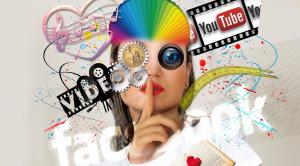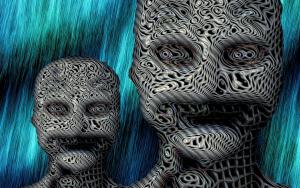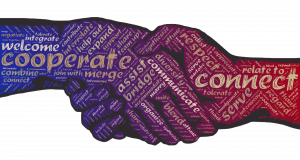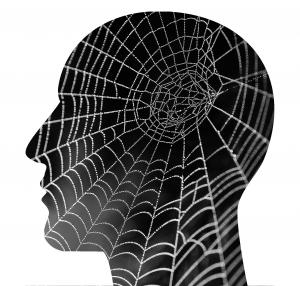
I’ll admit, my first response was to panic when I saw the news about Charlottesville. I almost let fear and paranoia completely take over my life in an unhealthy way. Thankfully I caught the errant thought processes and started an immediate routine of emergency self-care. I made sure I was eating and taking my medication properly. I’m also trying to get into a regular sleep pattern. But I’m letting myself off the hook for almost allowing my illness take over. I’m constantly learning the lesson of patience and being steadfast in times of crisis. Sometimes I fare better than others. It all depends on my mental state and if I’m healthy or not when the test comes. It also depends on the level of my Iman. Patience for someone with impulse control issues and bipolar disorder is extremely difficult. But with Allah’s help it’s achievable. Once I realized I was doing more panicking than praying and reflecting, I started to focus on what’s important in my life. I knew I needed to get back to basics in order to remain healthy through this and other emergencies.
There are multiple tests that I’m dealing with in this current climate. But mainly it’s my identity, I find, that challenges me the most. It’s the things that I love about myself, even when I experience doubts, that causes some parts of my world not to love me back. I’m African American. I’m a woman. I’m a Muslim. And I live with mental illness. All of these components make up who I am. And they have an impact on how the world views me. My daily routine, whether I leave my house or not is interrupted by microaggressions in one way or another. Additionally, because I’m so vocal on social media, I sometimes forget about the fact that I’m disabled. But when the depression or anxiety hits and I’m homebound for a period of time, I remember all too well.
These days in the wake of Charlottesville and it’s aftermath, I’ve been in somewhat of a holding pattern. I can go out for a few days here and there, then I have to rest. The mental exhaustion of pulling myself together to interact with the outside world overwhelms me. I have to shut down, like a computer that’s overheated. At home, I still want to be productive, and frankly, I like talking to people for the company. So I’m active on my social media channels. It helps ease the loneliness I often feel. But the same people who may have hidden or overt racial and religious issues with someone like me, are online, just like I am.
Charlottesville is very polarizing for me because I’m a minority in my online community. First, it’s not often for me to interact with black hijabis who either have or discuss mental illness from my particular viewpoint; much like in my real-life communities. Therefore, when race comes up, things get a bit dicey. I’ve fought hard not to be bitter or paranoid in the presence of people who haven’t done anything but show me kindness. Yet I struggle with the idea that I can’t express my hurt and anger at longstanding racial inequality and reckless nationalism. Tackling the issues of the day brings up a lot of feelings for people in my circles on all sides. Yet it also has given voice to my emotions which has been an extremely freeing process.
My intention in speaking my truth isn’t to be upsetting or spiteful just for the sake of it. I just can’t reconcile that the voice of hate and injustice is often louder than the voice of peaceful equality. If only to drown out what I deem to be wrong in our world, I’m speaking up about these issues and their lasting effects. And as an advocate, I’d like to start talking more about how these systems affect people of color with mental illness. Or at least how I, as a black woman, have been affected.
In the past when I used social media I saw a lot of unkind comments, as we all often do. Social media can be caustic. But this was at a time when my illness wasn’t well controlled. I never knew if what I saw was because of my race, religion, or mental health. Or a combination of all 3. It didn’t help matters that I wasn’t on medication nor in therapy. So my behavior, just like in my real life, was different than what people expected of me.
Most people would probably be able to brush online comments aside and move on with their day. However, because I was sick, I was much more sensitive to things that were hurtful. I used to get so upset at every slight, every rough comment and I’d delete my accounts in haste. Any racially insensitive or bigoted comments sent me into a complete tailspin. Sometimes I’d even have anxiety attacks over bigotry online, fearing that I’d face that kind of behavior when I left my home. I vowed never to use social media again on more than one occasion. I’d often ruminate over what people said either directly to me, or in sub comments, for hours or days on end. The comments would play repeatedly in my head and I’d believe the hurtful things I read. My self-esteem suffered and I felt really low about myself and my life.
Social media plays a large part in the life of someone like me. Often, you find solidarity and companionship in people online more so than you do in your life with live people. Whether it’s due to stigma or busy schedules, misinformation and a lack of understanding about your illness, the internet can be a life saver for someone with mental health issues. But there’s also a vicious cycle that you go through when you’re unwell and using social media. Because of illnesses like depression and anxiety, you may feel terrible and often shun interaction with the outside world. Then you get online for a distraction, and sometimes see more hurt and pain. You’re not able to filter out errant messages you get from your laptop or phone. So, you end up feeling worse. Even if you’re doing well with your illness, world emergencies are a test for your mental illness.
During a major event, you may get triggered by images you see or by people’s opinions on what happened. Though I now use the internet liberally, when I was still healing, there was a time I couldn’t use social media safely. I wasn’t well enough to handle the nuances of this form of communication without having some kind of meltdown. Certainly not during any type of crisis. A case in point is the tragedy with Mike Brown. Unfortunately, I did not weather this difficult time well and I did end up getting sick. Without going into too many details, I experienced a psychotic depression because of what I was seeing on tv and online. Between the images and people’s comments, I couldn’t maintain my grip on reality. Looking back, if I had known better and had the support system I do now, I would have done things very differently. I would have engaged in self-care, reached out for help and gone to the hospital if I needed to. But back then, I was living alone and not healing well from personal tragedy, in addition to my living with my routine mental health issues. My options for keeping myself safe were limited. Going through a major racial event, even when it is not in your location, brings up so many feelings and emotions that are difficult, if not impossible to channel on your own. When you add in mental illness, it can be an overly taxing situation.
So, I stayed away from all my channels for about a year and focused on my relationships in real life. But when I was headed toward wellness, I rejoined my online communities. With the help of my therapist, I learned how to filter out comments and content that is upsetting and I began to focus on my goals. He taught me to not internalize what I was seeing, and to log off when I feel overstimulated. We worked on regulating how I respond to world events, along with the aftermath on social media. I’ll probably always need outside help in remaining centered with that. It’s better than the alternative of not using social media altogether. For me, as I’m often sidelined by my illness and use the internet to interact, it’s vital that I feel safe online. And that I use my voice properly as well.
I’ve noticed that my faith is growing stronger in these trying times. I’m also relying on my support system to help me stay well. I’m grateful that people have been there for me to make sure I’m stable and handling the stress in a positive manner. With this article, and with my social media for that matter, I certainly don’t intend to speak for all people with mental illness and how they get through troubling times. Nor am I speaking for all people of color with mental illness. I just wanted to share a piece of my journey in hopes that I can begin to shed light on what it’s like to live with a serious mental illness during a national crisis. One in which your skin color is so troubling to some groups that they are working actively against your entire existence.












